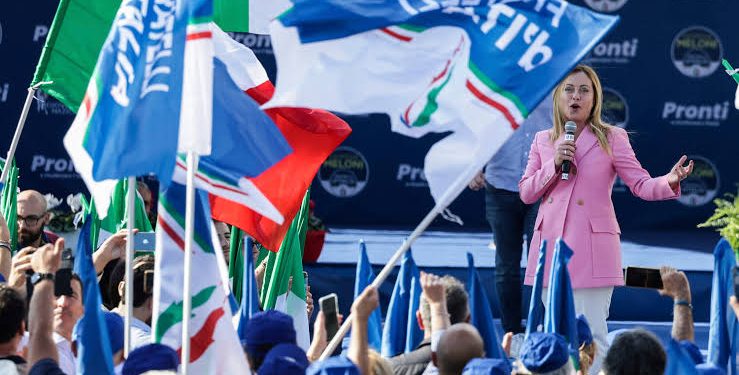By Oyintari Ben
Italy’s voting is now complete. One exit poll predicts that the country’s first female prime minister will be the far-right head of a party with neo-fascist roots.
At a critical moment for the European continent, when nations are struggling with energy prices and the war in Ukraine is still going on, the election may shift the nation’s politics drastically to the right.
In the 2018 election, the party of Giorgia Meloni’s Brothers garnered little over 4% of the vote. However, an exit poll predicted it would garner 22-26%.
According to a Consorzio Opinio Italia poll conducted by Rai, the right-wing alliance is estimated to have received 41–45% of the total vote.
The centre-left coalition of former Democratic Party Premier Enrico Letta, who received 29.5% of the vote, was the front-runner.
If elected, Ms Meloni will make history as Italy’s first female prime minister and the first far-right leader to lead a significant eurozone economy.
Following the fall of Mario Draghi’s national unity government in late July, the election was held six months ahead of schedule.
Ms Meloni is a member of a right-wing coalition that also includes anti-immigrant League leader Matteo Salvini and three-time premier Silvio Berlusconi, the leader of the Forza Italia party who created the party thirty years ago.
“In the lower house and the Senate, the centre-right is obviously in the lead! Even though it will be a hard night, I want to thank you,” Mr Salvini stated on Twitter.
The coalition-building process is anticipated to run until at least mid-October; therefore, it could take some time before the next prime minister is officially announced.
Early Rome voters showed concerns with Italian politics in general.
Adriana Gherdo spoke at a voting location in the city, saying, “I hope we’ll see honest people, and this is tough nowadays.”
Given Ms Meloni’s criticism of “Brussels bureaucrats” and her connections to other right-wing leaders, the election in the third-largest economy in the eurozone will be widely monitored in Europe.
She recently stood up for Viktor Orban of Hungary when the European Commission suggested freezing billions of euros in aid to that country due to worries about democratic backsliding and potential financial mismanagement of the EU.



































